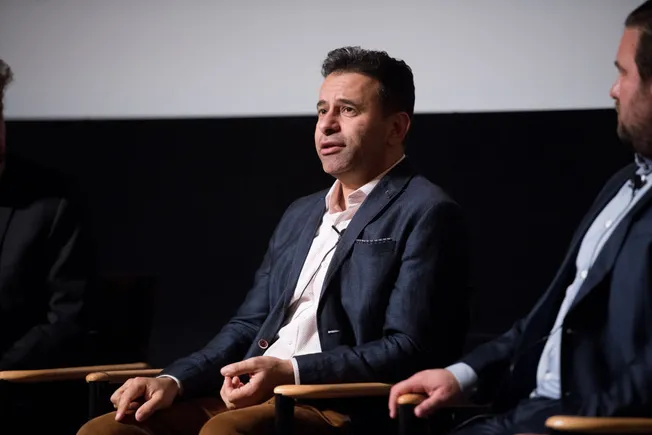Discover how music therapy redefines dementia care by unlocking emotions, reducing distress, and building meaningful connections in institutional settings.
 Analysis: How and why music therapy reduces distress and improves well-being in advanced dementia care: a realist review. Image Credit: Unai Huizi Photography / Shutterstock
Analysis: How and why music therapy reduces distress and improves well-being in advanced dementia care: a realist review. Image Credit: Unai Huizi Photography / Shutterstock
‘Severe’ or ‘advanced’ dementia is a terminal form of neurodegenerative disease characterized by extreme patient distress and the need for institutionalization. Previous research has suggested the calming potential of music therapy, but clinical evidence and mechanistic understandings of this intervention remain insufficient.
In a recent realist review published in the journal Nature Mental Health, researchers used a multiphase approach incorporating both scientific (including systematic reviews and meta-analyses) and stakeholder (experts, caregivers, and family) inputs to develop a program theory for using music therapy in dementia care.
The resultant program theory subsumes individual, institutional, and interpersonal contexts to outline the elements of music therapy, clearly distinguishing between trained therapist-delivered interventions and music-based interventions conducted by untrained facilitators. These elements may trigger hidden mechanisms such as meeting unmet patient needs and improving caregiver situational understanding, with result outcomes highlighting immediate, observable reductions in agitation and anxiety following music therapy. While additional research is required to understand the role of therapy duration, frequency, and infrastructural support in music therapy outcomes, this realist review underscores the therapy’s future application and calls for further clinical research to optimize its delivery.
Background – dementia and the need for innovative treatment options
‘Dementia’ is a collective term for a group of chronic neurodegenerative conditions that severely compromise a patient’s cognitive and memory functions, thereby complicating routine (everyday) activities. Dementia is a progressively worsening disease with no known cure. Alarmingly, dementia prevalence has been rising at unprecedented rates – more than 55 million people currently live with the condition, with this number expected to expand to 78 million by 2030 and 139 million by 2050.
Given the lack of a cure, conventional research efforts have focused on means to prevent or delay dementia onset and progression. However, given the spectrum of pathologies observed and variations in patient responses to generalized interventions, researchers have begun focusing on improving living conditions for patients and their families. Recent reviews have highlighted a shift from prior emphasis on physical support to frameworks focused on mental well-being.
“The National Institute for Health and Care Excellence (NICE) states that psychosocial, or nonpharmacological, interventions should be the first line of treatment for distress behaviors in dementia care. The World Health Organization highlights the need for more research to enable the development of clinical and cost-effective toolkits for psychosocial interventions to manage distress.”
Music therapy
‘Music therapy’ is a relatively recently developed field involving a trained professional using music to address their patients’ unmet emotional, physical, cognitive, and social needs. Recent clinical findings suggest that music therapy may have the clinical potential to suppress distress (short-term), improve patient engagement, and provide holistic relief from dementia-associated anxiety.
Unfortunately, the field's novelty and the associated lack of a standardized testing framework complicate the interpretation of study outcomes. Clinical applications of music therapy are further hindered by the prevalent lack of understanding of the mechanisms governing music therapy’s observed benefits.
About the study
The present study leverages a realism-based approach to elucidate the potential benefits of music therapy in dementia treatment. Realism is a rigorously validated, theory-based epistemological framework for understanding the mechanisms underpinning observed outcomes and unintended interactions following clinical interventions. The study incorporates both subjective expert opinion and objective research outcomes to arrive at its results and recommendations.
The study further seeks to investigate the mechanisms governing observed outcomes and develop a standardized framework for future research in the field. It focuses on patients diagnosed with ‘advanced dementia.’ Frequently synonymized with ‘severe’ dementia, advanced dementia is often characterized by agitation, resistance to care or therapeutic intervention, and distress behaviors routinely requiring institutionalization. Given the frequent co-occurrence of advanced dementia and institutionalization, the study focuses on institutionalized individuals.
The study was conducted over three interactive phases. The first phase involved the use of ‘reflective thematic analysis (RTA)’ on music therapist interview data (n = 11) and sentence completion exercises with study participants (advanced dementia patients, n = 5). The second phase leveraged the Rayyan platform to conduct a broadscale systematic literature review using keywords, phrases, and texts identified in phase one. Notably, this literature review incorporated music-based interventions independently of the supervision of trained music therapists. In the third phase, researchers developed three intervention frameworks, labeled context–mechanism–outcome configurations (CMOCs), addressing the individual (CMOC 1), interpersonal (CMOC 2), and institutional (CMOC 3) factors.
“CMOC 1 – Music therapy delivered regularly and flexibly (C) attunes to and meets unmet needs in the moment (M), reducing distress and improving well-being in the short term (O). CMOC 2 – When staff and families are involved in music therapy sessions (C), reciprocity, communication, and mutual understanding with the person with dementia increase (M), changing staff attitudes and impacting care delivery (O). CMOC 3 – Structures and time for knowledge exchange (C) enable regular communication between staff, families, and music therapists (M), with music used to manage distress and regulate the environment (O).”
Study findings and recommendations
While the neurophysiological mechanisms underlying the benefits of music in dementia care remain hypothetical, the present review elucidates that music therapy can nonverbally meet ‘unmet’ dementia patient needs. Proceeds from the collation and analysis of previous literature identified 16 research articles providing a rough framework for music therapy-based interventions. This framework is comprised of ‘mechanism’ (resource + reasoning) and ‘outcomes’ (short-term + overall).
This rough framework was supplemented by 11 systematic reviews, 3 meta-analyses, and 29 research studies (including randomized controlled trials) to derive context–mechanism–outcome configurations (CMOCs), separated by layers of reality – individual needs, interpersonal dynamics, and institutional contributions. While an infrastructural CMOS is implied, a lack of specific data limited its generalizability.
“Key areas of uncertainty not addressed in the current theory were the role of staff training, type and purpose of the setting, the impact of medication, the impact of hearing, and outcomes for staff and family members.”
Conclusions
The present study validates the inclusion of music therapy as a beneficial intervention against the stress-inducing aspects of advanced dementia. It derives from more than 50 previous works in formulating three context–mechanism–outcome configurations, each addressing a different participant in the institutional environment. These CMOS are also conceptual frameworks and guidelines for future clinical trials, particularly since present evidence is insufficient to elucidate treatment facets such as optimal therapy duration, session timing, and long-term impacts.
“The theory supports much of the current training and practice of music therapy in dementia care internationally, particularly the focus on meeting needs at the moment. It also highlights the contextual factors required for collaboration with staff and family members to ensure the short-term benefits of music for the individual can be embedded in everyday care and contribute to the management of distress in the wider environment.”
Journal reference:
- Thompson, N., Odell-Miller, H., Underwood, B.R. et al. How and why music therapy reduces distress and improves well-being in advanced dementia care: a realist review. Nat. Mental Health (2024), DOI – DOI: 10.1038/s44220-024-00342-x, https://www.nature.com/articles/s44220-024-00342-x

 5 days ago
3
5 days ago
3
















.png)

.png)
.png)
.png)













 English (US) ·
English (US) ·  Hindi (IN) ·
Hindi (IN) ·